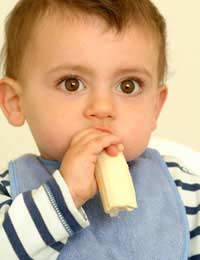Your Toddler's Nutritional Needs

Young children need to eat well for energy and growth. Many toddlers are fussy eaters but vital nutrients are found in a wide variety of foods – so it should always be possible to provide a healthy, balanced diet.
Energy
Toddlers need about 1000 calories a day (the daily intake for adult women is 2000 and 2500 for men) from across all the major food groups:- meat, fish, poultry and eggs – 2 portions daily
- bread, cereals, rice, potatoes and pasta – 5 portions daily
- fruit and vegetables – 5 portions daily
- dairy produce and other calcium-rich foods – 4 portions daily
Carbohydrates
Carbohydrates are found in starchy foods like bread, cereals, rice, potatoes and pasta. They provide children with much of the energy they need every day.Fats
Fats play a vital role in providing energy, carrying vitamins around the body and helping build cell membranes. Toddlers need more fat than adults – up to a third of their total food intake – so a low-fat diet is not appropriate.Some of this can come from saturated fat, found in foods like cheese, whole milk, yoghurt and fatty meat. However, many toddlers eat too much saturated fat, which can cause obesity and lead to heart disease in later life. The main culprits are junk and fried foods and snacks like crisps, cakes, biscuits, chocolate and pastries. Fruit, raw vegetables, toast, crackers and cereals make much healthier snacks.
Good sources of unsaturated fats – which should make up the majority of fat intake – are oily fish; olive, vegetable and nut oils and spreads; avocadoes, nuts and seeds. Remember that toddlers can choke on whole nuts and they may also cause allergic reactions in some children, check out the information on allergies at our sister site www.kidsallergies.co.uk.
A note about oily fish: due to high levels of dioxins in oily fish, the government advises that boys eat no more than four portions a week and girls no more than two (to protect their reproductive health).
Calcium
Calcium is essential for strong bones and teeth. Milk is the most important source, which should be full fat up to the age of two. A pint a day is about right. Calcium is also found in dairy products; tinned fish like sardines, pilchards and salmon; tofu; eggs; bread (fortified with calcium by law); green leafy vegetables; okra; dried fruit like raisins, apricots and figs; pulses; seeds and nuts.Vitamin D
Vitamin D helps the body to absorb calcium. The most obvious source is sunlight; food sources include oily fish, eggs and spreads.Vitamin C
Vitamin C is essential for healthy skin, boosts the immune system and helps the body to absorb iron. It’s found in citrus fruits, berries, blackcurrants, kiwi fruit, tomatoes, peppers, broccoli and green leafy vegetables. Vitamin C can be destroyed in cooking, so serve vegetables raw or cook only lightly. It also diminishes over time – frozen vegetables are better than fresh ones that have been sitting around for days.Iron
Without iron, the body can’t make haemoglobin, which carries oxygen around the body. Red meat is a good source and so is liver (no more than once a week because too much vitamin A can be harmful). Good non-meat sources include green vegetables; dried fruit; beans, lentils and chickpeas; fortified breakfast cereals; and follow-on formula milk. Don’t be tempted to give iron supplements, because too much iron can be dangerous. If parents are concerned that a child might be anaemic (lacking in iron), they should always seek medical help.Vitamin C helps the body to absorb iron, so aim for a good balance of each on the plate, serve a piece of fruit after meals, or offer a glass of orange juice alongside.
Sugar and Salt
Sugary snacks and drinks can spoil children’s appetites and are bad for their teeth. Too much sugar also contributes to obesity and can lead to diabetes later in life. It’s best to keep these for treats.Too much salt (sodium) is bad for the kidneys and can cause high blood pressure later in life, so keep snacks like crisps to a minimum and don’t add any more salt at the table or in cooking. Processed foods may also contain a lot of salt.


Re: Superfoods on a Budget
I just checked out these fantastic tips for buying superfoods on a budget! Eating healthy doesn’t have to be expensive. Can’t wait to try…
Re: Fun Facts: How Many Calories Does a Child Burn?
hi, im eleven yrs. I weigh about 100 lbs and believe I am over the normal weight. I am about 4’10 ft. I…
Re: Fun Facts: How Many Calories Does a Child Burn?
I want to clear this up for everybody worried about their weight, especially at a young age you shouldn’t…
Re: Dealing with a Child that is Always Hungry
I am the great grandmother of an 8 year old that I mostly take care of her mom is around but she totally depends…
Re: Fun Facts: How Many Calories Does a Child Burn?
I’m 11 years old and recently got a smart watch. This isn’t a big question but I can’t find how many…
Re: Dealing with a Child that is Always Hungry
I'm immediately suspicious of an article that suggests cereal as a healthy snack. Cereal (especially cereal…
Re: Fun Facts: How Many Calories Does a Child Burn?
How many calories SHOULD an average twelve year old burn daily???
Re: Fun Facts: How Many Calories Does a Child Burn?
I'm 9 years old and I'm trying to set up a health journal but I don't know how many calories I should…
Re: Fun Facts: How Many Calories Does a Child Burn?
Hiw much calories should an average 10 year old burn a day?
Re: Dealing with a Child that is Always Hungry
I’m 16 and my sister is 11 years old 57 inches and weighs 90 pounds she only drinks like 2 or 3 16 ounce bottles…